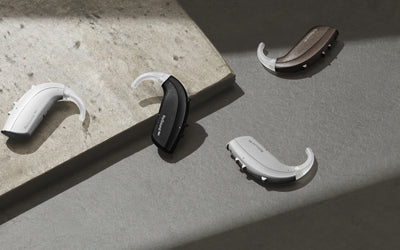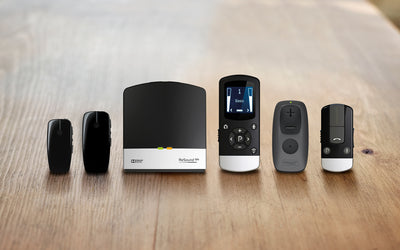By
Ailish Hamilton
Tinnitus, often described as a persistent ringing or buzzing in the ears, can be a challenging and distressing condition for those who experience it. While tinnitus can result from various factors, one common link is hearing loss. This connection has led to the exploration of hearing aids as a potential solution to alleviate tinnitus. In this blog post, we will delve into how hearing aids can assist in tinnitus management and improve the overall quality of life for individuals dealing with this condition
What is Tinnitus?
Tinnitus is when you hear a ringing, buzzing, or other noise in your ears, but there's no external source making that sound. It's like having a sound in your head that only you can hear. Tinnitus can be temporary or long-lasting and might vary in intensity.
What Causes Tinnitus?
Tinnitus can have various causes, but the exact reason why some people experience it while others don't can be complex. There can be quite a few causes, but here are some common causes and contributing factors of tinnitus include:
- Exposure to Loud Noise
- Age-Related Hearing Loss
- Earwax Blockage
- Ear Infections or Injuries
- Medical Conditions
The Link Between Hearing Loss and Tinnitus
The relationship between hearing loss and tinnitus is a significant one. In simple terms, when hearing loss occurs, the absence of external sounds can be replaced by perceived internal sounds—tinnitus. It's important to note that not everyone with tinnitus has hearing loss, as some individuals with normal hearing may also experience this condition.
What's intriguing is that hearing loss can be gradual and often goes unnoticed. Many people are surprised when they discover that they have a hearing impairment. Interestingly, individuals frequently attribute their hearing difficulties to tinnitus rather than recognising hearing loss as a contributing factor.
Once a hearing loss has been identified, the journey to find suitable solutions can begin, and this is where hearing aids come into play.
Can Hearing Aids Help Tinnitus?
Hearing aids are primarily designed to address hearing loss, but they can provide a dual benefit when it comes to tinnitus. Here's how:- Amplification: Hearing aids amplify external sounds, making it easier for individuals to hear the world around them. By doing so, they divert the wearer's focus away from the internal sounds of tinnitus.
- Masking: Some hearing aids come equipped with sound masking or sound therapy features. These features provide soothing background noises, such as white noise or ocean waves, which can help mask or partially cover the tinnitus sounds, reducing their prominence.
- Enhanced Communication: For those who have both hearing loss and tinnitus, hearing aids can improve communication by enhancing speech clarity. This makes it easier to engage in conversations and social interactions.
- Reducing Tinnitus Awareness: Hearing aids can make individuals less aware of their tinnitus, effectively diminishing its prominence in their perception.
- Improving Quality of Life: Many people who use hearing aids to manage tinnitus report an overall improvement in their quality of life. They can once again enjoy the sounds of nature, engage in conversations with loved ones, and go about their daily activities with less distraction.
Our Recommended Hearing Aids for Tinnitus
In the journey of tinnitus management, hearing aids have emerged as a valuable tool, offering relief and improved quality of life for individuals with hearing loss and tinnitus. If you are experiencing tinnitus, especially if you suspect hearing loss, contact us today where one of our expert audiologists can analyse your hearing loss and Tinnitus level to find you the perfect hearing aid.

Shop All Hearing Aids
Shop now
Shop Accessories
Shop now
Speak To Our Audiologists
Contact Us
